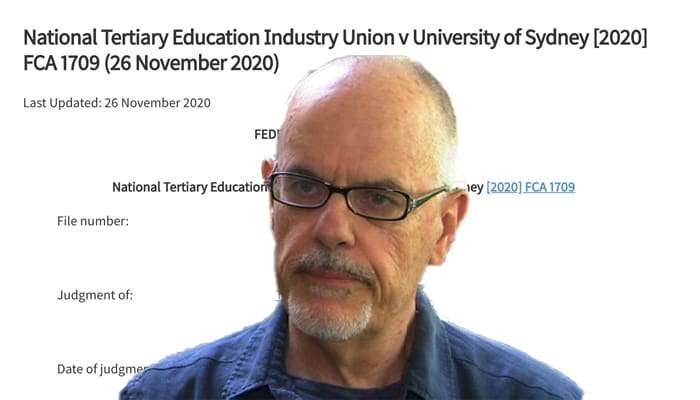Former University of Sydney Political Economy lecturer, Dr Tim Anderson, has lost a Federal Court challenge to his firing by the University last year. The Court held that the University of Sydney Enterprise Bargaining Agreement (USyd EBA) does not create a legally enforceable right to intellectual freedom for staff.
Anderson was fired by the University last year after posting a slide containing an image of a swastika superimposed on the Israeli flag.
The staff union, the National Tertiary Education Union (NTEU), was also a party to the proceedings, as the Court’s interpretation of the USyd EBA carries precedent for its effect on all staff.
In an email to members yesterday, USyd Branch President Kurt Iveson wrote that though the NTEU did not endorse Anderson’s posts, “we believed Dr Anderson’s dismissal had profound implications for the exercise of intellectual freedom for all university staff.”
Iveson tells Honi that the NTEU will be “prioritising enforceable academic and intellectual freedom clauses” in the next round of Enterprise Bargaining next year.
“We absolutely need such an enforceable right for the university to fulfil its core purpose of serving the public good through research and teaching without fear or favour,” Iveson says. In 2013, University management attempted to strip out academic freedom protections from the USyd EBA.
“This issue is widely and deeply felt across our entire membership, it is just so fundamental to our ability to do our jobs. I can say with confidence that NTEU members will be ready to fight for enforceable rights to academic and intellectual freedom when bargaining starts.”
Iveson says that the NTEU is also “troubled” by the finding staff social media use, outside of work and with no explicit or direct connection to work, seem now to be “in scope” for management intervention, and possible employment termination.
“NTEU lawyers are still carefully working through the implications of that aspect of the case and decision, and we will have more to say on this one in coming days and weeks,” he says.
Anderson tells Honi that the NTEU may be considering an appeal.
The Court’s decision shows that Anderson’s firing followed a number of warnings being issued by the University since 2017, largely relating to posts from his personal social media accounts.
In one such post, Anderson shared a photo of several people at lunch, including his former colleague, Jay Tharappel, wearing a Houthi Resistance badge stating, in Yemini, “God is the greatest, death to America, death to Israel, curse on the Jews, victory to Islam.”
Other warnings pertained to Anderson’s refusal to remove posts responding to the media coverage of the photo of Tharappel, where he called Channel 7 “colonial media [that] promotes ignorance, apartheid and war”.
In an email to Honi, Anderson called the ruling an endorsement by the Court of “‘academic cancel culture” and alleged that the University’s decision to fire him was the result of “powerful lobbies us[ing] media allies to attack and abuse inconvenient academics.”
“We’re pleased with the outcome, as we were confident of our actions,” a University spokesperson told Honi.
“We strongly defend freedom of speech and the ability of our staff to express their expert opinion as outlined in our Charter of Freedom of Speech and Academic Freedom. However, staff must also meet their obligations to engage in respectful debate in line with our policies and codes of conduct, and in accordance with the law.”
Anderson’s case is not the only to have tested protections on academic freedom this year. In July this year, marine physicist Peter Ridd lost a challenge to his firing from James Cook University in the Federal Court. Ridd alleged he had been unfairly terminated for criticising his colleagues’ research on the impacts of climate change on the Great Barrier Reef
The University of Sydney Charter of Freedom of Speech, implemented in response to the French Review into Free Speech at Universities, went into effect at the beginning of the year.
Faculty of Arts Dean, Annamarie Jagose, and incoming Vice Chancellor, Stephen Garton, was named in the proceedings with Anderson alleging he had breached the USyd EBA and the Fair Work Act. A plaque was erected this week to mark the end of Vice Chancellor Vice Spence’s term, embellished with the words “We must learn to disagree well.”





